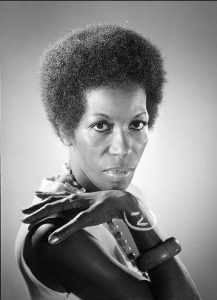(Jul. 16, 1919-Mar. 10, 2017). Born in Toledo, Ohio, Mari Evans arrived in Indianapolis in 1947. She was a John Hay Whitney Fellow in 1965-1966, established by the John Hay Whitney Foundation in 1946 to provide educational support to minorities and the economically underprivileged.
She allied with the Black Arts Movement, a 1960s-1970s movement that created new cultural institutions and conveyed a message of Black pride. From this perspective, she produced and narrated The Black Experience, a television program about African Americans that appeared from 1968 to 1973 on Channel 4. It was during this time that she published her first book, (1968).
Evans joined the faculty of (IUPUI) in 1969 teaching the course, “Recent Black American Writing.” The following year, her book, (1970), asserted the role of Black women in creating African American culture and instilling resiliency in the community. Her play or choreopoem (a form of dramatic expression that combines poetry, dance, music, and song), premiered at in May 1977. Evans viewed her 1979 adaptation of , a musical of , written by Zora Neale Hurston, who portrayed racial struggles in the South during the early 1900s, as an extension of her love and passion for music. Her later writings include (1992), (2004), and (2007). She also wrote children’s books.
In 1983, Evans was the editor of the anthology . Her goal for the project was “lofty and complex.” The project brought together 39 African American writers and critics “for the single, serious purpose of discussing the creative works of contemporary African-American women.”
In the March/April 2007 issue of the , the official magazine of the , Evans noted, “The only insurmountable obstacle I’ve faced is being a Black writer.” She stated that being African American made her struggles for recognition as an artist much more difficult than being a woman. It gave her no way to “cross into a realm that would pay more.” Nevertheless, Evans proclaimed that she was most concerned with truth and integrity in her writing.
Evans also was an activist for the Black community. She protested at the steps of the Indiana War Memorial in June 1975 in response to the death of Byron L. Richardson following a high-speed chase. In 1976, she was involved with and served as a chairperson for the Black Educational Coalition. She was against the death penalty and fought for prison reform. She once noted that she was a “philosopher, poet, writer. I am all that; I am a political writer.”
Her legacy lives in her work and in the recognition of her status as a major Black writer. Created in 1996, The Zora Neale Hurston-Mari Evans Scholarship helps to educate students at IUPUI. Uganda issued a postage stamp of Evans in 1997. She received recognition as a Living Legend by the in 2004, the Indiana Authors Award (), and the 2015 Indiana Authors Award Lifetime Achievement Award. There is a large mural of Evans on 448 Massachusetts Avenue created by Michael Jordan, a.k.a. ALKEMI, in 2016.

Help improve this entry
Contribute information, offer corrections, suggest images.
You can also recommend new entries related to this topic.





